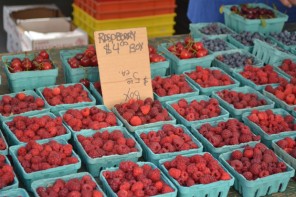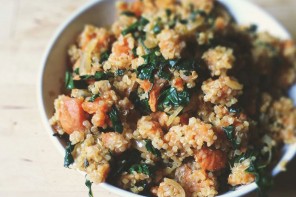Written by: Giulia Simolo
You’ve definitely heard some tips to reduce your carbon footprint, but spare a thought for lowering your food mileage. What does this mean and how can you achieve it? Read on to find out why it’s so important for the environment.
“Food miles” refers to the distance food is transported from its production until it reaches the consumer. It might not be something you’ve thought about when you have tucked into a delicious meal, but here’s some food for thought: according to Sustain, for every calorie of carrot flown in from South Africa to Europe, a total of 66 calories of fuel is spent. That contributes a great deal to increasing the CO2 emissions.
Lowering food mileage is about being more conscious concerning what it takes to bring your food to you and how you can prevent the food having to travel a long distance. If you lower the miles your food has had to travel to reach you, you’re making a difference and helping the planet.
Here’s how to lower your food miles:
Choose local produce
One of the easiest ways to lower food mileage is to take notice of what products you purchase and ensuring that you buy local produce in future. This means that the produce hasn’t had to travel a long distance to reach you and you’re significantly cutting down on transportation costs and air pollution thanks to CO2 emissions. Buying imported goods not only takes up a lot of energy, but it also reduces the chance local farmers have of thriving. We have many great products right here at home, so we don’t need to go to the trouble of importing goods.
Grow your own vegetables
Imagine taking a short walk to get your hands on delicious produce? A vegetable or herb garden is a great way to cut down on food miles and it’s also healthier for your family because you know that no chemicals have gone into the planting and growing of your produce. You don’t need to go to a lot of trouble to keep your vegetable garden working for you, and once it starts to give you delicious vegetables that taste so much purer than the store bought variety, you’ll never look back.
Stick with seasonal food
What this means is that you buy produce, such as fruits, that are currently in season so that you work with what your country has to offer you without having to look elsewhere for produce. When foods are seasonal, they’re also at their freshest and healthiest, and their prices are lower.
Try to shop once or twice a month
If you find yourself at the supermarket every second day because you’ve run out of goods, just think of all the miles that are literally going towards your shopping trips. Rather clump your shopping trips together, focusing on one or two excursions per month, so that you buy everything you need in a smaller number of outings. The bonus is that you will save some money on petrol costs! If you want to go one step further (literally), why not leave the car at home and take a walk to the shops if they happen to be in your area?
Make food more sustainable
Instead of throwing out foods that you haven’t had a chance to consume or chucking out those leftovers from last night’s dinner, try to maximise what you have so that you avoid wastage. Food can be sustainable; you just have to think in creative ways. For instance, if you have food that you bought but haven’t eaten and it’s got a shelf life, why not use it in a meal that you can donate to your local charity or host a cook-out where you invite friends over for dinner and you all agree to cook a dish to enjoy? As for food leftovers, try to use them for the next night’s dinner or for your lunch the next day. Those lentils that weren’t eaten could be teamed up with rice and potatoes for something tasty tomorrow night. Try to use every last ounce of food as much as you can so that it prevents waste and means you don’t have to continue buying more to replace what you have thrown out.
The liveeco team









